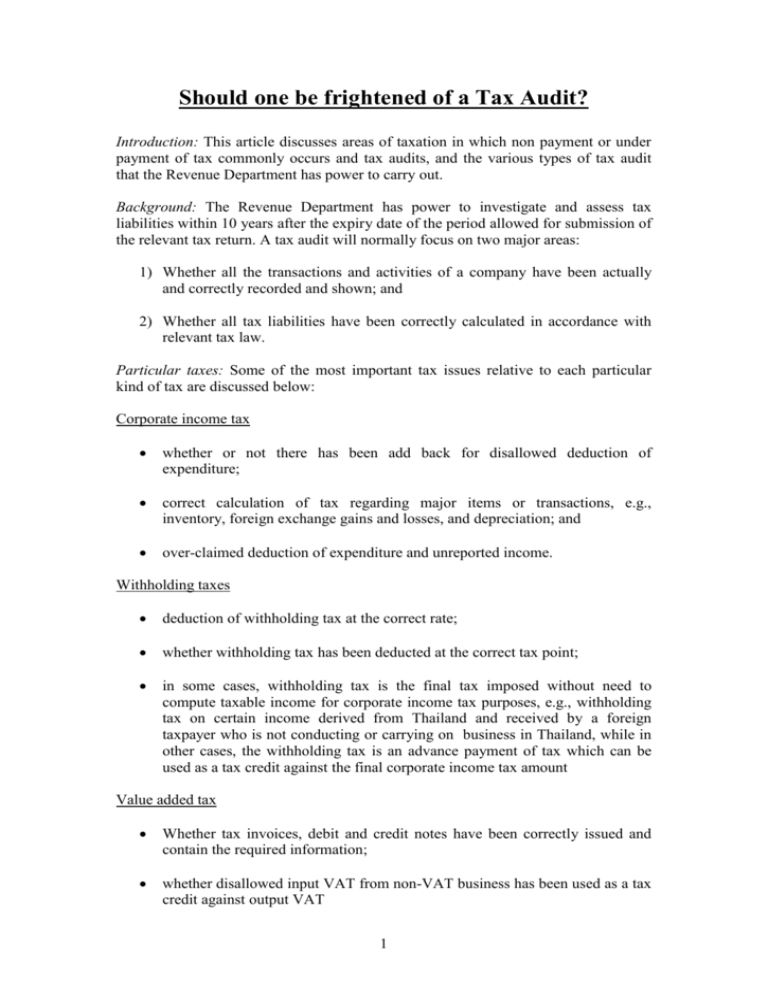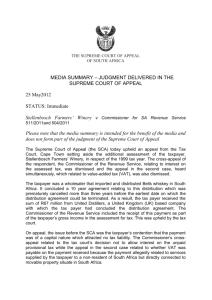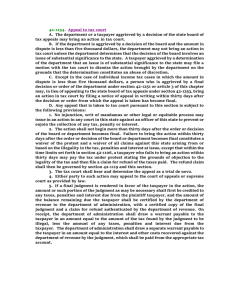Should or should not scare of Tax Audit
advertisement

Should one be frightened of a Tax Audit? Introduction: This article discusses areas of taxation in which non payment or under payment of tax commonly occurs and tax audits, and the various types of tax audit that the Revenue Department has power to carry out. Background: The Revenue Department has power to investigate and assess tax liabilities within 10 years after the expiry date of the period allowed for submission of the relevant tax return. A tax audit will normally focus on two major areas: 1) Whether all the transactions and activities of a company have been actually and correctly recorded and shown; and 2) Whether all tax liabilities have been correctly calculated in accordance with relevant tax law. Particular taxes: Some of the most important tax issues relative to each particular kind of tax are discussed below: Corporate income tax whether or not there has been add back for disallowed deduction of expenditure; correct calculation of tax regarding major items or transactions, e.g., inventory, foreign exchange gains and losses, and depreciation; and over-claimed deduction of expenditure and unreported income. Withholding taxes deduction of withholding tax at the correct rate; whether withholding tax has been deducted at the correct tax point; in some cases, withholding tax is the final tax imposed without need to compute taxable income for corporate income tax purposes, e.g., withholding tax on certain income derived from Thailand and received by a foreign taxpayer who is not conducting or carrying on business in Thailand, while in other cases, the withholding tax is an advance payment of tax which can be used as a tax credit against the final corporate income tax amount Value added tax Whether tax invoices, debit and credit notes have been correctly issued and contain the required information; whether disallowed input VAT from non-VAT business has been used as a tax credit against output VAT 1 If the taxpayer does not comply fully with the law, it may be subject to a penalty, surcharge or fine. With regard to major VAT violations which often cause taxpayers to be subject to a penalty and surcharge, the following are important: 1) illegally issuing a tax invoice. In this case, the taxpayer who issued the tax invoice will be liable for a penalty equal to double the VAT of the invoice, and the receiving taxpayer cannot use the same for credit against its own output VAT; 2) regarding stocktaking, if there are any missing items after reconciliation with the inventory report, these missing items are treated as sold already for VAT purposes. Therefore the taxpayer must pay VAT for these items plus a penalty equal to double the VAT amount; 3) conducting business without registering for VAT, failure to submit monthly VAT returns on time, or not issuing a tax invoice to a customer or service recipient. In these cases the taxpayer may be subject to a penalty equal to double the VAT involved. The above VAT penalties may be reduced where it is determined that the taxpayer did not intend to evade tax or assisted or co-operated in the tax investigation. Tax audit: There are four important types of tax audit that may be encountered: 1) Operational Inspection Visit This is carried out in order to understand the nature of the business of the taxpayer and to offer information to the taxpayer on taxes relevant to its business for tax compliance purposes. In this sort of visit, there is no intention to carry out a tax investigation, and it is usually newly established businesses that receive such a visit. 2) Compliance Visit This is normally conducted on an annual basis. Its purpose is to investigate tax non-compliance. 3) Investigation following request for a tax refund This concentrates mainly on tax compliance issues relating to the tax refund applied for. 4) Investigation by summons This is normally carried out after an investigation following a request for a tax refund in order to extend the prescription period. The summons can be issued within two years from the date of submission of the relevant tax return, but may be extended to five years. If the taxpayer does not comply with the summons, then it has no right to appeal against any assessment. 2 Request for tax refund: A taxpayer can request a refund for excess tax previously paid or deducted. A request for a tax refund must be accompanied by the relevant documentary evidence to prove the excess tax amount. Withholding tax and VAT can be refunded within three years from a request for refund. Stamp duty can be refunded within 10 years. The taxpayer who is entitled to the refund may also be entitled to interest calculated on the amount of the refund. Such interest will be calculated from the end of a period of three months commencing from the expiry of the period for submission of the tax return or tax form. Rights of appeal: A taxpayer may appeal to the Appeal Committee against an assessment made against it. The appeal must be made in writing using the specified form. The type of tax, tax month and year, tax amount and details of assessment, and the reasons for objecting to the assessment must appear in the appeal. The appeal must be filed within 30 days after receipt of the assessment. If the taxpayer does not agree with the decision of the Appeal Committee, then it can file a further appeal to the Tax Court within 30 days after the date of receipt of the decision of the Appeal Committee. The taxpayer must still pay the tax due within the specified time according to the tax assessment made, pending the decision of the Appeal Committee or judgment of the Tax Court, because the appeal or petition cannot relieve the taxpayer from tax liability on the assessment. Conclusion: A tax audit should not cause a taxpayer to feel nervous or apprehensive. Provided that it has correctly calculated the tax to be paid and paid it within the due date, there should be nothing to fear. It is also very important that taxpayers should take proper professional advice regarding their tax obligations, and also when notice of a tax audit is given. © Teerakarn Noichuam, Bangkok International Associates 2009 __________________________ Bangkok International Associates is a general corporate and commercial law firm. For further information, please contact Teerakarn Noichuam by email at teerakarn@bia.co.th or telephone (66) 2 231 6201. 3





